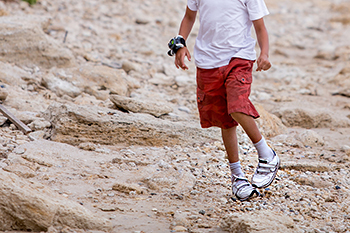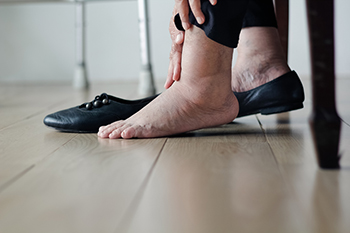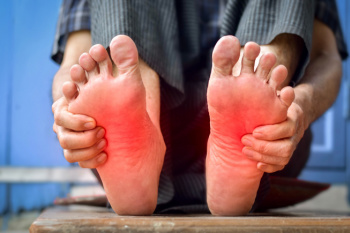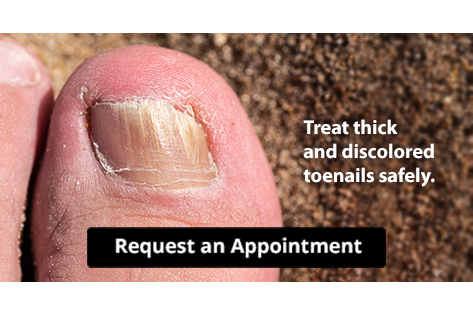Items filtered by date: June 2025
Understanding Congenital Foot Deformities in Children

Congenital foot deformities are conditions present at birth that affect the structure and alignment of a child's feet. Metatarsus adductus involves inward bending of the front part of the foot. Clubfoot causes the foot to turn inward and downward. Calcaneovalgus results in an upward and outward positioning of the foot, while congenital vertical talus creates a rigid flatfoot with the sole facing outward. These deformities can impact walking, balance, and comfort, if not treated early. A podiatrist can diagnose these conditions through physical examination and imaging, then develop a treatment plan that may include stretching, casting, bracing, or surgical correction. If you notice unusual positioning or movement in your child's feet, it is strongly suggested that you promptly consult a podiatrist to ensure early intervention and healthy development.
Congenital foot problems require immediate attention to avoid future complications. If you have any concerns, contact One of our podiatrists of Diagnostic Foot Specialists. Our doctors can provide the care you need to keep you pain-free and on your feet.
Congenital foot problems are deformities affecting the feet, toes, and/or ankles that children are born with. Some of these conditions have a genetic cause while others just happen. Some specific foot ailments that children may be born with include clubfeet, polydactyly/macrodactyly, and cleft foot. There are several other foot anomalies that can occur congenitally. What all of these conditions have in common is that a child may experience difficulty walking or performing everyday activities, as well as trouble finding footwear that fits their foot deformity. Some of these conditions are more serious than others. Consulting with a podiatrist as early as possible will help in properly diagnosing a child’s foot condition while getting the necessary treatment underway.
What are Causes of Congenital Foot Problem?
A congenital foot problem is one that happens to a child at birth. These conditions can be caused by a genetic predisposition, developmental or positional abnormalities during gestation, or with no known cause.
What are Symptoms of Congenital Foot Problems?
Symptoms vary by the congenital condition. Symptoms may consist of the following:
- Clubfoot, where tendons are shortened, bones are shaped differently, and the Achilles tendon is tight, causing the foot to point in and down. It is also possible for the soles of the feet to face each other.
- Polydactyly, which usually consists of a nubbin or small lump of tissue without a bone, a toe that is partially formed but has no joints, or an extra toe.
- Vertical talus, where the talus bone forms in the wrong position causing other bones in the foot to line up improperly, the front of the foot to point up, and the bottom of the foot to stiffen, with no arch, and to curve out.
- Tarsal coalition, when there is an abnormal connection of two or more bones in the foot leading to severe, rigid flatfoot.
- Cleft foot, where there are missing toes, a V-shaped cleft, and other anatomical differences.
- Macrodactyly, when the toes are abnormally large due to overgrowth of the underlying bone or soft tissue.
Treatment and Prevention
While there is nothing one can do to prevent congenital foot problems, raising awareness and receiving neonatal screenings are important. Early detection by taking your child to a podiatrist leads to the best outcome possible.
If you have any questions, please feel free to contact our offices located in Houston, TX, Houston, TX, and Bryan, TX . We offer the newest diagnostic and treatment technologies for all your foot care needs.
Causes of Poor Foot Health in Seniors

Foot problems become increasingly common with age due to wear and tear, medical conditions, and footwear habits. Seniors often face bunions, which are painful bumps that form when the big toe shifts out of place, sometimes causing inflammation and discomfort. Corns and calluses develop from pressure and friction, especially when shoes do not fit properly. Thick, brittle, discolored, or ingrown toenails can also become problematic and may lead to pain or infection. Other issues from improper footwear in seniors include arthritis-related stiffness, plantar fasciitis and heel spurs causing arch or heel pain, and flat feet or high arches that alter foot alignment. Nerve-related conditions such as tarsal tunnel syndrome and Morton’s neuroma may also cause burning, tingling, or cramping sensations. If you are experiencing foot pain, it is suggested that you schedule an appointment with a podiatrist for an exam, diagnosis, and appropriate treatment options.
If you need your feet checked, contact One of our podiatrists of Diagnostic Foot Specialists. Our doctors will attend to all of your foot and ankle needs and provide you with quality treatment.
Geriatrics and Podiatry
When people age, some common issues that may occur are bone density loss, dry skin, poor circulation, and rough brittle nails. These issues may also affect your foot health if the necessary steps are not taken to alleviate the problems.
It is important to take care of your feet because feet that are injured or diseased can affect your overall health. Having painful feet hinders your ability to do daily activities or may decrease your willingness to do the things that you need to do.
Visiting Your Geriatrician
As we age, health problems become more likely, so it is essential to visit your doctor for check-ups to ensure that you are doing the best you can to take care of your health. It is recommended to check your feet frequently for any possible cuts, bruises, swelling, corns or any other irregularities.
Taking Care of Elderly Feet
Cracked or dry feet can be treated by applying moisturizer often. It is also important not to wear old socks because the older the sock is, the higher the possibility there will be that there is bacteria there. Wear fresh socks and make sure they fit properly.
Proper foot health means that you can have a more active lifestyle and you will not be bogged down by pain. Foot health also leads to good circulation, which is paramount for overall health.
If you have any questions, please feel free to contact our offices located in Houston, TX, Houston, TX, and Bryan, TX . We offer the newest diagnostic and treatment technologies for all your foot care needs.
Stop Your Toenail Fungus
Foot Complications From Diabetes

Diabetic foot ulcers and neuropathy are serious complications of diabetes that can lead to infection, hospitalization, or even loss of limbs if left untreated. Neuropathy, or nerve damage, reduces sensation in the feet, making it difficult to feel pain, heat, or injuries. This numbness increases the risk of unnoticed wounds, which can develop into open sores called ulcers that are slow to heal. These ulcers often occur on pressure points like the ball of the foot or heel. Symptoms may include redness, swelling, drainage, and, in severe cases, a foul odor. Some people may not feel any pain due to the loss of sensation, which can delay treatment. A podiatrist will examine your feet, assess circulation, and possibly use diagnostic tools like X-rays or vascular studies. Treatment may involve wound care, custom footwear, antibiotics, and offloading pressure from the affected area. If you have diabetes, it is strongly suggested that you are under the care of a podiatrist who can help you to manage this serious condition.
Diabetic foot care is important in preventing foot ailments such as ulcers. If you are suffering from diabetes or have any other concerns about your feet, contact One of our podiatrists from Diagnostic Foot Specialists. Our doctors can provide the care you need to keep you pain-free and on your feet.
Diabetic Foot Care
Diabetes affects millions of people every year. The condition can damage blood vessels in many parts of the body, especially the feet. Because of this, taking care of your feet is essential if you have diabetes, and having a podiatrist help monitor your foot health is highly recommended.
The Importance of Caring for Your Feet
- Routinely inspect your feet for bruises or sores.
- Wear socks that fit your feet comfortably.
- Wear comfortable shoes that provide adequate support.
Patients with diabetes should have their doctor monitor their blood levels, as blood sugar levels play such a huge role in diabetic care. Monitoring these levels on a regular basis is highly advised.
It is always best to inform your healthcare professional of any concerns you may have regarding your feet, especially for diabetic patients. Early treatment and routine foot examinations are keys to maintaining proper health, especially because severe complications can arise if proper treatment is not applied.
If you have any questions, please feel free to contact our offices located in Houston, TX, Houston, TX, and Bryan, TX . We offer the newest diagnostic and treatment technologies for all your foot care needs.
Recognizing the Signs of Foot Arthritis

Foot arthritis can significantly affect daily comfort and mobility. Common symptoms include swelling, stiffness, pain with movement, and visible joint deformities. These symptoms may develop gradually and worsen over time. Osteoarthritis results from wear and tear, rheumatoid arthritis is an autoimmune condition, and post-traumatic arthritis can occur after injury. Lifestyle choices such as maintaining a healthy weight, staying active, and wearing supportive footwear can help manage symptoms and slow progression. A podiatrist can offer targeted treatments including custom orthotics, and guidance on activity modification. If you are experiencing persistent foot discomfort or limited mobility, it is suggested that you promptly contact this type of doctor who can create a personalized plan that improves quality of life and preserves joint function.
Arthritis can be a difficult condition to live with. If you are seeking treatment, contact One of our podiatrists from Diagnostic Foot Specialists. Our doctors can provide the care you need to keep you pain-free and on your feet.
Arthritic Foot Care
Arthritis is a joint disorder that involves the inflammation of different joints in your body, such as those in your feet. Arthritis is often caused by a degenerative joint disease and causes mild to severe pain in all affected areas. In addition to this, swelling and stiffness in the affected joints can also be a common symptom of arthritis.
In many cases, wearing ill-fitting shoes can worsen the effects and pain of arthritis. Wearing shoes that have a lower heel and extra room can help your feet feel more comfortable. In cases of rheumatoid arthritis, the arch in your foot may become problematic. Buying shoes with proper arch support that contour to your feet can help immensely.
Alleviating Arthritic Pain
- Exercises that stretch the foot can prevent further pain and injury and increase mobility
- Most of the pain can be alleviated with anti-inflammatory drugs, heat, and topical medications
- Massages can help temporarily alleviate pain.
It is best to see your doctor for the treatment that is right for your needs and symptoms. Conditions vary, and a podiatrist can help you determine the right method of care for your feet.
If you have any questions please feel free to contact our offices located in Houston, TX, Houston, TX, and Bryan, TX . We offer the newest diagnostic tools and technology to treat your foot and ankle needs.

